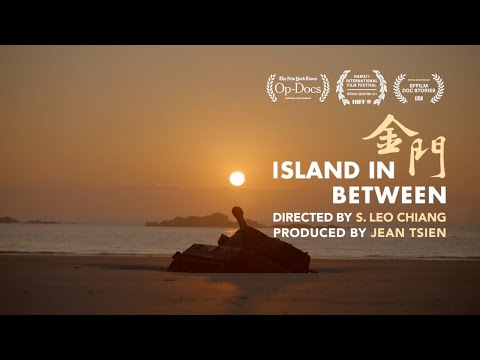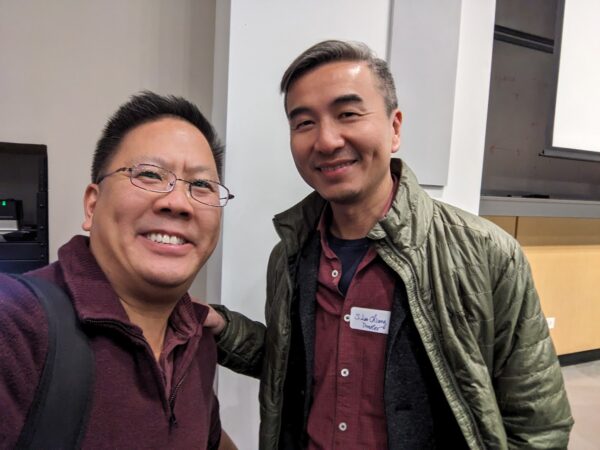 I live in Silicon Valley, and one of the benefits is that I live about five miles from Stanford University, where are often quite a few events of interest to me that are open to the public. Recently, there was a screening of recently 2024 Oscar nominated short documentary ‘Island In Between’ by S. Leo Chang:
I live in Silicon Valley, and one of the benefits is that I live about five miles from Stanford University, where are often quite a few events of interest to me that are open to the public. Recently, there was a screening of recently 2024 Oscar nominated short documentary ‘Island In Between’ by S. Leo Chang:
“I [S. Leo Chiang] was born in Taiwan, grew up in the United States, worked extensively in China and now live in Taipei. This mix of experiences has given me a front-row seat to the complex, decades-long dance between these nations. Lately, the world is paying considerably more attention to my homeland, especially after the former U.S. House speaker, Nancy Pelosi, visited in August 2022.
Kinmen, also known as Quemoy, is a group of islands governed by Taiwan that were the front lines of the first and second Taiwan Straits Crises decades ago. They lie just a few miles from mainland China, and these days, locals are unsure what escalating tensions mean for the future.
Taiwanese voices are often drowned out by Chinese and American narratives, overshadowed by the global power plays going on around us. Few people outside the region understand what life is actually like for the Taiwanese people caught in between two superpowers. I made this documentary to show life in Taiwan through the eyes of the people who live there, including me.
At this moment, as we struggle to make sense of the horrors of war, I hope this documentary can play a small part in advocating for peace.” – Film and Text by S. Leo Chiang
I had heard of Kinmen, but I didn’t realize that the Taiwanese island was so close to mainland China. It is so close that there is a swimming contest between Kinmen and the city of Xiamen – about 3.7 miles / 6 kilometers). One can see the cityscape of Xiamen’s skyscrapers from Kinmen. I learned about the history of Kinmen and the people on the island, which is about 130,000 residents. Supposedly, half of that number only reside part of the year there.
Even though Kinmen is so close, the People’s Republic of China (PRC) was never able to take over the island. There were also diplomatic considerations, especially in the 1950s, with the United States having fought Chinese troops in the Korean War and the growing U.S. presence in Vietnam. This just demonstrates that any amphibious assault of Taiwan would be treacherous and even more dangerous and challenging than D-Day, as U.S. World War II planners had considered when the Japanese occupied Taiwan.
I have seen S. Leo Chiang’s previous documentaries, A Village Called Versailles, as well as Mr. Cao Goes to Washington (about the first Vietnamese American elected to Congress). I had met him a while ago so it was a real pleasure to see Leo again after so long. Leo spends most of his time in Taiwan.
The pre- and post Q&A at Stanford lead by Kharis Templeman (Research Fellow at the Hoover Institution and the manager of the Project on Taiwan in the Indo-Pacific Region) was equally as interesting.
The short documentary is only 19 minutes and well worth your viewing if you have any interested in China-Taiwan and U.S. relations. I think this review summarizes my feelings about the film:
“This is not a film for people wedded too closely to ideological perspectives of their own; at least not nationalistic ones. Having also spent a good part of his life in the US, Liang describes himself as feeling like the child of a three way divorce, tugged between countries which want to possess him and define his identity but which have little interest in his perspective. This is his opportunity to respond – and to do so before an international audience, at that. It’s also an opportunity to remind people in the US-ally grouping that we are subject to propaganda just as the other side is.
Liang grew up with constant messages about how awful China was, and about how Taiwan was the home of the true Chinese people who would one day invade their larger neighbour and free the people there (who outnumber them 60 to one). It’s a sentiment which made less and less sense in a nation where young people increasingly identified with English-speaking nations; more recently, the big pull has been from China itself, seen as a land of economic opportunity. Liang doesn’t go into depth on that – nor does he address the interesting linguistic issues at play – but he does explore the difference between the China he had been taught to imagine, full of hardship and misery, and the one he found, full of great shopping opportunities and entertainment. Perhaps there should have been a clue in that skyline seen from across the water, its skyscrapers towering over the charmingly old fashioned houses and public buildings of Kinmen.
Latterly, due to Covid, the island’s relationship with China has changed yet again, making for an interesting postscript. What really makes this film appealing, however, is the way in which Liang weaves together the personal and the political, reminding us that no matter the stories which those in power like to tell, on either side, they are meaningless in the face of actual human interconnection. To be from a place in between is to function as a point of connection, and although this may make Kinmen vulnerable, it also bequeaths it a magical quality which Liang’s film captures in its final shot full of water and sky and light.”
Definitely worth 19 minutes of your time. It’s available on YouTube for free, courtesy of The New York Times Op-Docs.








